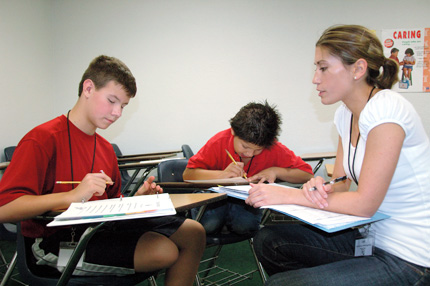Getting a master’s degree is difficult. Students deal with prior commitments, struggles, loans and everything else imaginable. Try getting a master’s degree while having to overcome years of anxiety and insecurity from living with a speech impediment.
That’s exactly what Lisa Bennett did.
Bennett graduated in December from Wichita State University with a Master of Arts in Communication Sciences and Disorders, closing one chapter in her life and opening up life after college. Bennett has stuttered since she was 4 years old and has had a long journey to get to where she is today.
Life after high school
Bennett attended high school in Mulvane. After graduation she went to Fort Hays State University for one year as a speech-pathology major before returning to Wichita to attend Wichita State.
“I wasn’t ready to take responsibility for my speech,” said Bennett.
Bennett changed her major to computer science upon her return to WSU. She quickly realized computer science wasn’t right for her and changed her major to psychology.
“My future was very uncertain,” said Bennett. “I didn’t know what I was capable of because I never gave myself a chance.”
“It was always so much easier to just avoid speaking situations that I thought would be difficult,” she said.
Bennett went through the psychology program and graduated with a bachelor’s degree, but suffered anxieties about speaking in the workplace. She was too nervous to work in a setting that required her to talk and realized the real world would be a reality check.
“I had a nuclear meltdown,” said Bennett. “Now I’m supposed to go out in the working world and I was still spending enormous amounts of energy trying to hide my stuttering from people.”
After graduation
Bennett worked a few temporary jobs following graduation and avoided any jobs that required her to talk.
“I was the queen of data entry jobs,” she said. “As long as I was sitting there typing away I didn’t have to interact with people.”
Bennett worked data entry jobs for about two years and even requested that a phone not be placed on her desk.
“It was embarrassing, but I was willing to live with that because I didn’t think I was capable of making calls and using the phone at work,” she said.
She eventually wound up at an employment agency, where she took an assembly line position with York, makers of heaters and air conditioners.
“It was not right for me,” said Bennett. “I couldn’t live with knowing that stuttering chose that job for me.”
Working on the line gave Bennett a different perspective on life.
“I had a lot of time to think, and I saw a fork in the road,” she said. “I can let stuttering continue to make my decisions for me or I can choose something else now. If I don’t, it’s got me.”
Bennett made up her mind to go back to school and get a master’s degree.
A new beginning
Bennett decided to pursue a master’s degree in communication sciences and disorders. She started in 2007 and took many prerequisite classes before pursuing the main curriculum of the program.
“I’ve enjoyed it,” she said. “I’ve done things I never thought I could do.”
Since being in the program, Bennett has administered to clients as part of the Evelyn Hendren Cassatt Speech Language-Hearing Clinic, a requirement for master’s students. She’s also worked with kids, taken part in camps and has completely come to grips with who she is as a person.
“Through exceptional personal courage, commitment and perseverance, Lisa will graduate, having already secured a job as a speech-language pathologist,” said Anthony Dilollo, associate professor in the department of communication sciences and disorders.
“More significantly, she succeeded in reframing the story of her life from one of a victim of stuttering, to one of a powerful opponent, who not only will overcome stuttering’s influence in her own life but also play a role in helping others to do the same.”
Bennett got a job as a speech pathologist with EBS Healthcare. In the future, she hopes to work at the elementary school level helping kids with a variety of communication disorders, including the emotional and social issues that accompany those disorders. Eventually, she wants to specialize in speech fluency.
“It really is a gift to be able to relate to a kid right as they walk through the door,” said Bennett. “I feel like it helps them to know that I understand what it’s like to feel different.”
Bennett has come a long way from the college graduate punching data into computers. In the past four years, she has faced and conquered her anxieties to help kids with speech and language problems.
Her best memory from WSU comes from a literacy camp she attended. At camp she had to teach a lesson on vocabulary and comprehension, which involved reading a story out loud to kids. After the reading, she felt a huge sense of fulfillment at how well she had done and at how engaged the kids were.
“I just felt so different than I did a few years ago,” she said. “A few years ago I would think I was incapable of reading a story to some kids.”
As Bennett advances in life, her future is bright and she knows the sky is the limit.
“Now that I’m presenting myself as me, stuttering me, I’m OK with that,” said Bennett. “There’s just so much that’s beyond that if you can go that way.”


 Anthony Marrone
Anthony Marrone